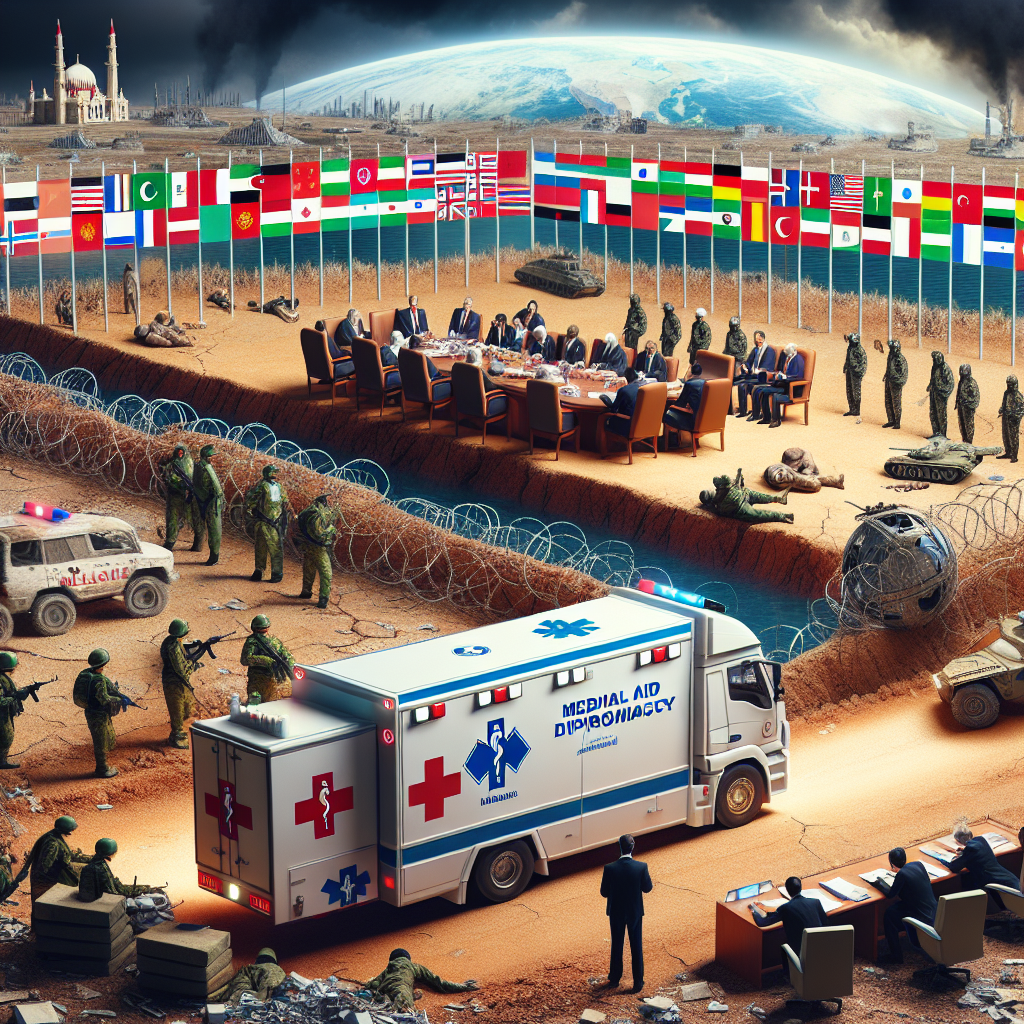Title: The Global Crisis Continues: Conflicts, Catastrophes, and Moments of Hope
Introduction
The world today is navigating an intricate web of challenges—from escalating wars to devastating natural disasters, technological breakthroughs, and inspiring stories of resilience. This week's global headlines capture the spectrum of human experiences, reflecting the complexities and interwoven nature of international affairs. With the spotlight on global conflicts and diplomacy, this article delves into the ongoing Russia-Ukraine war, the deepening Gaza crisis, and other pivotal events shaping our shared global narrative.
Let's unpack these stories of war, recovery, and innovation, reflecting on the human and geopolitical implications each carries.
The Human Toll of Conflict
1. Russia Strikes Medical Facility in Sumy: An Unfolding Tragedy
It's a grim day for Sumy, Ukraine. Russian forces targeted a medical facility, forcing a desperate evacuation of dozens of patients. This harrowing event underscores the unrelenting humanitarian toll of the Russia-Ukraine conflict.
Civilian areas, particularly healthcare centers meant to heal and save lives, are increasingly caught in crosshairs. The people of Sumy now join the growing list of innocent victims who bear the brunt of a conflict that seems far from resolution.
The international community faces a crucial moment: How much longer can it watch as war erodes the fabric of humanity? As peace advocates call for de-escalation, the tragedy in Sumy adds urgency to diplomatic interventions.
2. Gaza Under Siege: Renewed Strikes and Escalating Crisis
The Gaza Strip, a region historically fraught with conflict, finds itself in the throes of another humanitarian crisis. Recent Israeli strikes have left the densely populated region in devastation—over 710 Palestinians have died in recent escalations, while hospitals buckle under a complete blockade.
Reports from aid workers paint a bleak picture. Women and children, disproportionately affected, struggle against a backdrop of crumbled infrastructure and limited medical supplies. The international community has yet again been summoned to the table, with calls to lift blockades and negotiate ceasefires.
For Gaza, however, the big question is: When will cycles of violence stop? Advocacy groups are pressuring global leaders for not just temporary remedies but long-term peace solutions—a monumental task but one that must be confronted.
Nature’s Wrath: Floods in Spain
Southern Spain, typically synonymous with sunshine and beaches, faced a brutal assault of rain, causing floods that forced the evacuation of 365 homes near Málaga. While the Mediterranean region braces itself against climate change, natural disasters like this reinforce the urgent need to address global environmental instability.
But beyond the numbers lies the story of families watching their homes and possessions swept away by murky water. The emotional toll is profound and often ignored in statistics. Stories emerging from affected families highlight the importance of swift humanitarian aid and post-disaster recovery mechanisms.
This event is a chilling reminder: Climate change is not waiting for governments to act—it’s here, altering lives in devastating cycles.
Innovation Amid Chaos
Nvidia’s AI Robot ‘Blue’: A Glimpse into Tomorrow
Amid crises, stories of hope emerge through innovation. Nvidia’s introduction of its AI robot ‘Blue’ is an eye-opening milestone. With live interaction capabilities, ‘Blue’ promises to revolutionize industries ranging from healthcare to education.
Such breakthroughs ignite a question: How can innovation coexist with human suffering in such polarized times? While technology undoubtedly has transformative potential, equitable distribution of these tools remains a pressing issue.
Nevertheless, as robots like 'Blue' demonstrate, the limits of human creativity know no bounds. A key discussion point now lies in harnessing such technologies for global benefit—be it in resolving conflicts, alleviating disaster responses, or advancing sustainable development.
Stories of Resilience
Pope Francis’s Recovery: A Light for the Catholic World
In a time rife with uncertainty, positive moments shine brighter. Pope Francis’s ongoing recovery from double pneumonia comes as a relief for millions of Catholics worldwide. The 86-year-old leader has been a moral compass for many, especially during tumultuous global periods.
As the Vatican releases updates, the Pope’s resilience reminds us of the human spirit’s capacity to endure. For believers, it’s a sign of hope—a beacon of faith amid an otherwise bleak backdrop.
Conclusion
Global crises, though seemingly diverse, are interconnected by their shared impact on humanity. Whether it’s the devastation in Sumy or the innovation showcased by Nvidia's robot, each event narrates one part of a broader story—the story of our shared global community.
We must ask ourselves: How can we collectively steer into a future that fosters peace, equity, and resilience? From demanding accountability in conflict zones to supporting recovery efforts for disaster-striken regions, every action counts.
Let us not only consume these stories but engage with them—be the call for change, the voice for the voiceless, and the hope that sees humanity through its most testing times.
Frequently Asked Questions (FAQ)
Q1: Why are medical facilities often targeted during conflicts?
Medical facilities often symbolize hope and life and can sometimes become strategic targets in a bid to demoralize communities. However, targeting them is a violation of international law.
Q2: What can international organizations do in conflict zones like Ukraine or Gaza?
Organizations can provide humanitarian aid, foster peace negotiations, and push for ceasefires. Advocacy for accountability through tribunals is also essential.
Q3: How does climate change exacerbate natural disasters like floods in Spain?
Climate change increases the intensity and frequency of extreme weather events, making regions more susceptible to devastating floods, droughts, and heatwaves.
Q4: Will AI robotics like Nvidia’s ‘Blue’ lead to job loss?
While automation might replace some traditional roles, it also opens up opportunities in high-skill industries, especially in AI programming, robotics, and maintenance.
Q5: How can individuals contribute to global peace and development?
One can contribute by staying informed, supporting reputable aid organizations, advocating for sustainable policies, and participating in local or global initiatives.
Tags
#GlobalConflicts #HumanitarianCrisis #Innovation #ClimateChange #PopeFrancis #GazaCrisis #AIrobotics
Final Review: This article has integrated key SEO strategies, including optimized keywords, a compelling call-to-action, and a logical structure. Its tone conveys both urgency and hope, blending factual reporting with emotional engagement. Test it on various devices to ensure readability.
